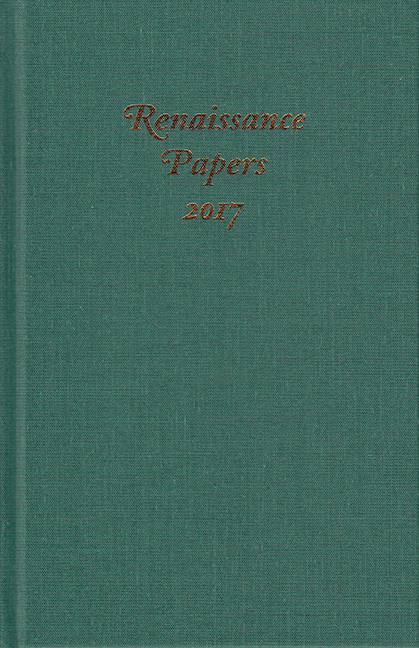Book contents
- Frontmatter
- Contents
- Dedication
- The Contested Pliability of Sacred Space in St. Paul's Cathedral and Paul's Churchyard in Early Modern London
- Classicism from Urbino: The Bichi Chapel Frescoes by Francesco di Giorgio Martini
- Visualizing the Paragone in Francisco de Zurbarán's Crucifixion with a Painter
- A Change in the Making: Shakespeare's Ovidian Sleep of Death and Display
- Old Black Rams and Mortal Engines: Transhumanist Discourse in Othello
- Dying with Speed and Felicity: Humor and Death in Book 3 of the Faerie Queene
- “If Devils Will Obey Thy Hest”: Devils in Dr. Faustus and The French Historie
- Rewriting Lucrece: Intertextuality and the Tale of Lucrece
- Economy and “Honesty” in Thomas Middleton's A Chaste Maid in Cheapside
- Glossing Authorship: Printed Marginalia in Aemilia Lanyer's Salve Deus Rex Judaeorum
- Botany and the Maternal Body in Titus Andronicus
- Unhorsing the Lustiest Challenger: Reflections on Chivalry in Richard II and Henry IV, Part 1
Economy and “Honesty” in Thomas Middleton's A Chaste Maid in Cheapside
Published online by Cambridge University Press: 04 April 2019
- Frontmatter
- Contents
- Dedication
- The Contested Pliability of Sacred Space in St. Paul's Cathedral and Paul's Churchyard in Early Modern London
- Classicism from Urbino: The Bichi Chapel Frescoes by Francesco di Giorgio Martini
- Visualizing the Paragone in Francisco de Zurbarán's Crucifixion with a Painter
- A Change in the Making: Shakespeare's Ovidian Sleep of Death and Display
- Old Black Rams and Mortal Engines: Transhumanist Discourse in Othello
- Dying with Speed and Felicity: Humor and Death in Book 3 of the Faerie Queene
- “If Devils Will Obey Thy Hest”: Devils in Dr. Faustus and The French Historie
- Rewriting Lucrece: Intertextuality and the Tale of Lucrece
- Economy and “Honesty” in Thomas Middleton's A Chaste Maid in Cheapside
- Glossing Authorship: Printed Marginalia in Aemilia Lanyer's Salve Deus Rex Judaeorum
- Botany and the Maternal Body in Titus Andronicus
- Unhorsing the Lustiest Challenger: Reflections on Chivalry in Richard II and Henry IV, Part 1
Summary
FEMINIST critics of Thomas Middleton's A Chaste Maid in Cheapside have focused carefully on the leaky, grotesque female bodies of the play and have argued that they represent cultural anxieties about economic and social order, which these female bodies have the potential to undermine. Such readings have been highly influenced by Gail Kern Paster's “Leaky Vessels: The Incontinent Women of City Comedy,” in which Paster suggests that such representations of the female body “display that body as beyond the control of the female subject, and thus as threatening the acquisitive goals of the family and its maintenance of status and power.” Following Paster, Shannon Miller argues that the play presents women “as both insatiable consumers of value and unstable receptacles of value.” Recent criticism of the play, however, which explores the cultural and ideological work of the play and comments on the economic transactions within it suggests that the complexity of the play necessitates a reexamination of the roles of female characters within the play's economy, particularly one that considers female agency. Despite the fact that a number of scholars recognize that the play “insists on equivalences in the exercise of appetite, both male and female alike” and that, as a “blistering satire,” it “pokes fun” at everyone, the women of the play are frequently described as commodities within a male-controlled economy and thus divested of agency. Kathleen McLuskie, though, argues that “In A Chaste Maid, Middleton presents city dwellers who adapt to social change by learning to exploit it” and that this play, among Middleton's other plays, “is at its most original in extending the roles of city women.” This certainly seems to be the case. I argue that aside from being consumers of goods, the women of the play demonstrate strategic control in a broader economy in which sex, marriage, reproduction, land, and commodities intersect. Not only do these women meet the demand for “honesty” through strategies that allow them to control their value, they are also members of female communities that reinforce subversive agency within a complex urban economy.
Scholars have repeatedly shown that the female body was a locus of anxiety during the early modern period, and Middleton's play taps into those anxieties by presenting the female body as leaky or grotesque and the economy to which it is linked as carnivalesque.
- Type
- Chapter
- Information
- Renaissance Papers 2017 , pp. 111 - 124Publisher: Boydell & BrewerPrint publication year: 2018

